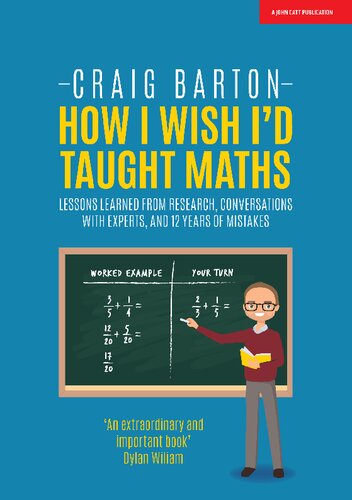

Most ebook files are in PDF format, so you can easily read them using various software such as Foxit Reader or directly on the Google Chrome browser.
Some ebook files are released by publishers in other formats such as .awz, .mobi, .epub, .fb2, etc. You may need to install specific software to read these formats on mobile/PC, such as Calibre.
Please read the tutorial at this link: https://ebookbell.com/faq
We offer FREE conversion to the popular formats you request; however, this may take some time. Therefore, right after payment, please email us, and we will try to provide the service as quickly as possible.
For some exceptional file formats or broken links (if any), please refrain from opening any disputes. Instead, email us first, and we will try to assist within a maximum of 6 hours.
EbookBell Team

4.8
34 reviews'I genuinely believe I have never taught mathematics better, and my students have never learned more. I just wish I had known all of this twelve years ago...'
When you speak to the likes of Dylan Wiliam, Doug Lemov, Daisy Christodoulou, Kris Boulton and the Bjorks, you are bound to learn a thing or two. But when he started his Mr Barton Maths Podcast, Craig Barton wasn’t expecting to have his whole outlook on teaching and learning turned upside down. How I Wish I’d Taught Maths is the story of an experienced and successful maths teacher’s journey into the world of research, and what it looks like in the classroom.
Along the way we meet practical, easy-to-implement strategies including Supercharged Worked Examples, Silent Teacher, SSDD problems, low-stakes quizzes, diagnostic questions, Purposeful Practice, self-explanations, harnessing the power of the hypercorrection effect, how to (and how not to) teach problem-solving and much more. No matter your experience, teaching style or favourite number, every maths teacher will find something to think about in this book.
Chapters
1. How students think and learn
2. Motivation
3. Explicit Instruction
4. Focussing Thinking
5. Self-Explanations
6. Making the most of Worked Examples
7. Choice of Examples and Practice questions
8. Deliberate Practice
9. Problem Solving and Independence
10. Purposeful Practice
11. Formative Assessment and Diagnostic Questions
12. Long-term Memory and Desirable Difficulties